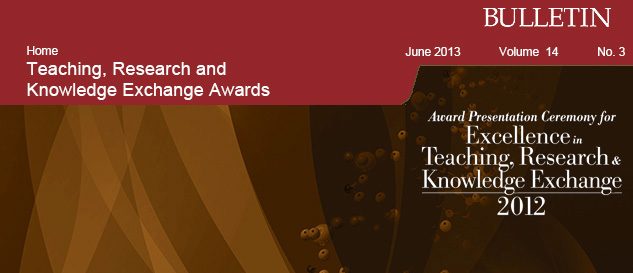| The Knowledge Exchange (KE) Award recognises academic work that has provided demonstrable benefits to the community, business/industry, or partner organisations. Award winners receive $50,000 to further their KE work. |
| Knowledge Exchange Award |

|
Faculty Knowledge Exchange Award |
|
Architecture A project to rebuild the collapsed arch of a 300-year-old in Taiping, Guizhou, led by Mr John Lin Chun-han, became a knowledge exchange opportunity to engage with the community and re-create public space. The bridge was rebuilt using stones recycled from the broken arch and pre-cast concrete, and students and staff from the Faculty collaborated with villagers and local government officials on its design. Arts This year, the award in the Arts Faculty was shared by Dr Peter Cunich and Dr Si Chung-mou. Dr Cunich was cited for his project to collect oral histories of Hong Kong survivors of the WWII, for compiling the largest collection of publicly available interview transcripts on the war in East Asia. Dr Si has led an eight-year project to enrich the teaching of Chinese in schools which traditionally has focussed on language matters only. He and his team have incorporated literature, history, philosophy and culture into language learning, resulting in 10 books for primary and secondary school students that have been published and distributed in Hong Kong, Macau, Mainland China, Taiwan and overseas. Business and Economics Dr James Vere’s studies on earnings mobility and statutory minimum wages have contributed to public policy debate in Hong Kong. He was commissioned to do two earnings mobility studies in 2005 and 2008 that were widely circulated. He also provided an independent background report and analysis on Hong Kong’s proposed minimum wage to a government commission. Dentistry Oral health was used in a project led by Professor Edward Lo Chin-man to enhance secondary school students’ understanding of biological sciences. Workshops were organised for secondary school teachers to help them use real-life dental problems, such as oral microorganisms, for teaching their subject. The project had the added benefit of increasing oral health awareness. Education Professor Mark Bray’s work on the ‘shadow education’ system provided by private tutors alongside the regular school system has been a wake-up call to governments around the world. He has shown how shadow education follows and impacts on regular schooling and also has implications for social inequality because it requires the payment of fees. His work has been published by UNESCO. Engineering The puzzle of how SARS spread within the Amoy Gardens housing estate in 2003 was solved with input from a team of HKU engineers led by Professor Li Yuguo, who showed how infected droplets were transmitted through the estate. Their work led to the development of ventilation guidelines that have been used by the World Health Organization. They have also advised the Indonesian government on isolation room design and trained 1,500 healthcare professionals. Law Mr Thomas Cheng Kin-hon played an important role in the formation of a law to curb anti-competitive conduct, which was passed by Hong Kong’s Legislative Council in June 2012. In 2006 he was asked by the government to advise on the drafting of the competition law. He was then asked by the Consumer Council to chair its Competition Policy Committee. Science The Faculty of Science launched the Junior Science Institute to provide secondary school students with hands-on programmes in different science disciplines so they can get a better understanding of thematic science issues. The Institute was launched in 2009 involving staff from the Faculty’s six departments and the Medical Faculty’s Department of Biochemistry and it enrolls about 1,000 students every year. Social Sciences Professor Paul Yip Siu-fai and his team are regional leaders in suicide prevention and they have worked with a wide range of community groups to implement a number of successful programmes. These include restriction of charcoal sales in supermarkets, good practices in media reporting of suicide, installation of platform safety-doors, and school and web-based well-being programmes. Hong Kong’s suicide rate fell by almost 30 per cent from 2003 to 2010. Knowledge Exchange Award (Non-Faculty Unit) The HKU Scholars Hub is a one-stop information source on the University’s research outputs and the achievements and profiles of 1,500 professorial staff, which previously was scattered in different systems or not available for public search. The Hub also includes media contact information for each academic indicating the languages and topics he or she is proficient in. By mid-2012 the Hub had more than one million view counts. |
| Back |